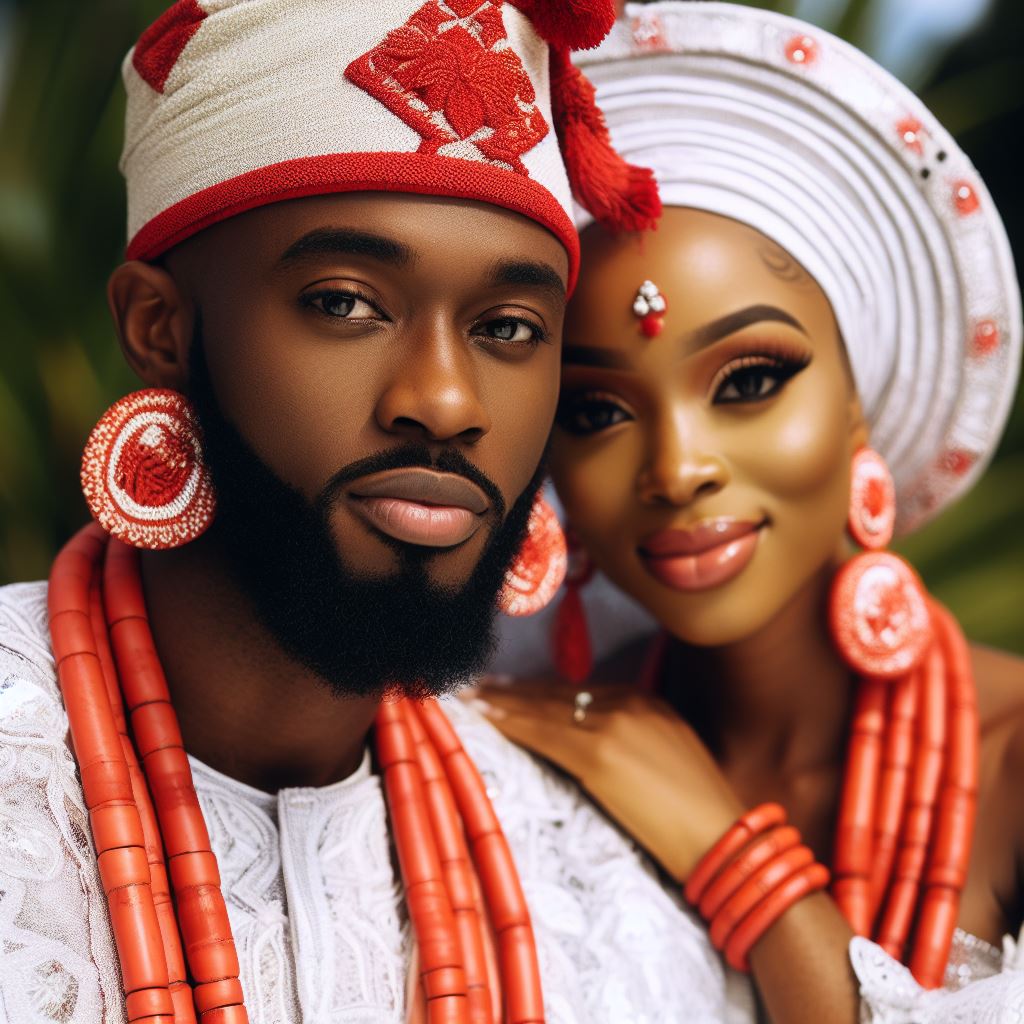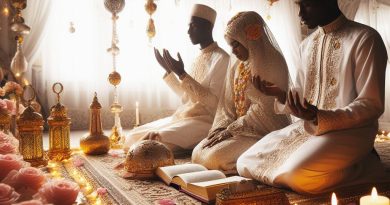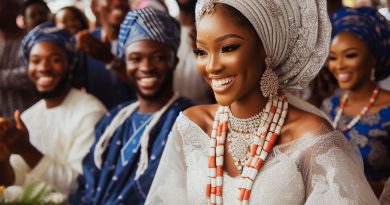Navigating Marital Roles and Responsibilities in Nigeria
Last Updated on October 20, 2023
Introduction
Let’s explore navigating marital roles and responsibilities in Nigeria.
Marriage, a cornerstone of Nigerian society, is a dynamic union that hinges on well-defined roles and responsibilities.
Understanding these dynamics is vital for a harmonious partnership.
In Nigeria, where traditions run deep, roles within a marriage are distinct yet evolving.
Recognizing and respecting these roles lay the foundation for a prosperous union.
Marital roles in Nigeria are deeply rooted in cultural and familial expectations.
Modern influences are reshaping these roles, adding layers of complexity and nuance.
Understanding the shifting landscape of gender roles is crucial for a balanced partnership.
Appreciating these roles fosters cultural sensitivity and strengthens the marital bond.
Navigating these roles facilitates smoother integration into extended families, a vital aspect of Nigerian marriages.
Clear role delineation reduces conflicts and fosters open communication within the marriage.
To forge a robust and enduring marital bond, it is imperative to navigate these roles effectively.
This ensures not only a harmonious partnership but also a foundation for personal growth and mutual support.
In this section, we delve into the intricate fabric of marital roles and responsibilities in Nigeria.
By understanding the historical, cultural, and contemporary nuances, we equip ourselves with the tools needed for a successful and fulfilling partnership.
So, let’s embark on this enlightening journey together.
Read: Celebrating Anniversaries: Thanking God for Years Together
Traditional Gender Roles in Nigerian Marriages
A. Overview of traditional gender roles in Nigerian culture
These traditional gender roles, although deeply embedded in Nigerian culture, have significant implications for marriages and the dynamics between couples.
They can contribute to gender inequalities and limit individual freedom and choice.
B. The responsibilities typically assigned to men in marriages
By assigning specific responsibilities to each gender, these roles can create a power imbalance within marriages.
Men often hold more decision-making authority, while women may have limited decision-making power and struggle for autonomy.
The burden of financial responsibility placed on men can also lead to immense pressure and stress.
They may feel the need to provide for their families regardless of personal circumstances, leading to potential strain on mental and emotional well-being.
C. The responsibilities typically assigned to women in marriages
Additionally, the expectations placed on women to solely take care of domestic chores can restrict their opportunities for personal growth and career advancement.
It can limit their access to education and professional development, further exacerbating gender inequalities.
D. The impact of these traditional roles on marriages and couples’ dynamics
These traditional roles can also negatively impact the overall relationship dynamics.
Lack of shared responsibilities and an unequal distribution of household chores can lead to strain, resentment, and dissatisfaction within marriages.
However, it is worth noting that more Nigerian couples are challenging these traditional gender roles.
With increasing gender equality awareness, many couples are renegotiating their roles and responsibilities to create more balanced partnerships.
Couples are adopting a more collaborative approach to decision-making, sharing household chores, and supporting each other’s personal and professional aspirations.
This shift is contributing to healthier and more fulfilling marital relationships.
In short, traditional gender roles persist in Nigerian marriages, defining the expected responsibilities for men and women.
These roles have significant impacts on marriages and couples’ dynamics.
However, with evolving societal attitudes, more couples are actively working to challenge and reshape these roles for a more equitable and balanced future.
Read: Marriage in Nigeria: Balancing Modern Views with Tradition

Shifting Dynamics and Modern Realities
A. The changing societal and cultural factors influencing marital roles and responsibilities in Nigeria
Traditional gender roles in Nigerian society have begun to evolve due to various factors.
The influence of westernization and globalization has brought about significant changes in marital dynamics.
The rise of women empowerment movements and advocacy for gender equality has impacted marital roles.
The emergence of modern technology and social media has also influenced the way Nigerians perceive marital responsibilities.
B. How increased education and employment opportunities have influenced these dynamics
- With increased access to education, Nigerians, especially women, are becoming more aware of their rights and abilities.
- Education provides individuals with critical thinking skills, which challenge traditional gender roles and stimulate change.
- The availability of employment opportunities outside the home has provided financial independence for both spouses.
- Dual incomes contribute to a shift in power dynamics and decision-making within marriages.
C. The impact of urbanization and globalization on traditional gender roles
- In urban areas, exposure to different cultures and lifestyles has influenced Nigerians’ perception of marital roles.
- Globalization has facilitated the exchange of ideas, leading to a reevaluation of traditional gender roles.
- Urbanization has created new opportunities and challenges, requiring adaptability in marital roles.
- The exposure to diverse perspectives has challenged the rigid notions of gender roles.
D. The importance of adapting to these shifting dynamics for a successful marriage
- Successful marriages require open-mindedness and a willingness to evaluate and adapt roles and responsibilities.
- Couples should engage in constant communication and negotiation to balance their expectations and aspirations.
- Embracing change can strengthen the bond between partners and help navigate modern challenges.
- Adapting to shifting dynamics allows couples to support each other’s personal and professional growth.
In brief, Nigeria’s marital roles and responsibilities are influenced by changing societal and cultural factors, increased education and employment opportunities, urbanization, and globalization.
It is crucial for couples to adapt to these dynamics to ensure a successful and fulfilling marriage.
Read: Understanding Nigerian Marriage Traditions and Rites
Navigating Marital Roles and Responsibilities
Marriage in Nigeria is a complex dance of traditions, expectations, and individual desires, and to perform this dance successfully, effective communication is paramount.
A. Communication as a Key Factor
- Open and Honest Conversations: The foundation of a harmonious marriage lies in openly discussing expectations and desires.
Couples must communicate honestly about their roles and responsibilities, recognizing that these can vary greatly among different cultures and backgrounds in Nigeria. - Strategies for Effective Communication: Misunderstandings and conflicts can be avoided by active listening and empathetic responses.
It’s essential to listen to your partner’s perspective and express your own without judgment.
B. Mutual Respect and Partnership
- Emphasizing Mutual Support: Marriage should be a partnership where both spouses support each other in all aspects.
Regardless of gender or societal norms, mutual respect and encouragement are key. - Equal Contribution: Equality in sharing household tasks and childcare responsibilities is crucial. Couples should work together to ensure fairness and balance in these roles.
C. Flexibility and Compromise
- Recognizing Strengths: Each spouse brings unique strengths to the marriage. Recognizing and utilizing these strengths can enhance the partnership.
- Understanding the Need for Compromise: Adapting to each other’s strengths and weaknesses requires compromise and flexibility. This allows the marriage to evolve and grow.
D. Seeking Professional Help and Advice
- Encouragement to Seek Counseling: When facing challenges in marital roles and responsibilities, seeking professional help is a wise step. There are various counseling and therapy options available in Nigeria.
- Availability of Support Systems: Nigeria offers resources and support systems for couples, from family counselors to marriage enrichment programs, to help navigate marital responsibilities successfully.
Essentially, navigating marital roles and responsibilities in Nigeria involves clear communication, mutual respect, flexibility, and a willingness to seek professional assistance when necessary.
By embracing these principles, couples can build strong, harmonious marriages that stand the test of time in this diverse and culturally rich nation.
Read: The Cultural Significance of Marriage in Nigeria: A Deep Dive
Conclusion
A. Importance of Navigating Marital Roles
In Nigeria, navigating marital roles is crucial for a successful and harmonious partnership. It fosters understanding and unity.
B. Final Thoughts on Key Factors
Effective communication, unwavering respect, flexibility, and seeking professional help are vital to maintain a thriving marriage.
C. Closing Remarks and Encouragement
Embrace evolving dynamics, work together for mutual understanding, and strive for lasting harmony in your marital journey in Nigeria.
Your love story can be a beautiful one.


